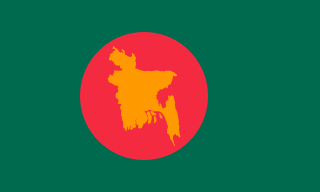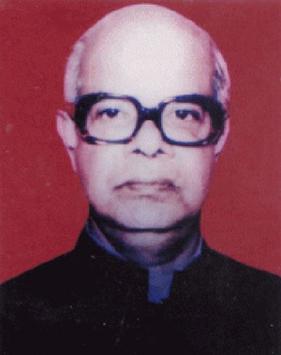Related Research Articles

Nurul Amin was a Pakistani politician and jurist who served as the eighth prime minister of Pakistan from 7 December to 20 December 1971. His term of only 13 days as prime minister was the shortest served in Pakistani parliamentary history. He was also the only Vice President of Pakistan.

Huseyn Shaheed Suhrawardy was a Pakistani Bengali barrister and politician. In Bangladesh, Suhrawardy is remembered as a pioneer of Bengali civil rights movements, later turned into Bangladesh independence movement, and the mentor of Bangladesh's founding leader Sheikh Mujibur Rahman. He is also remembered for his performance as the Minister for Civil Supply during the Bengal famine of 1943. In India, he is seen as a controversial figure; directly responsible for the 1946 Calcutta Killings, for which he is often referred as the "Butcher of Bengal" in West Bengal.

The Bengali language movement was a political movement in East Bengal in 1952, advocating the recognition of the Bengali language as a co-lingua franca of the then-Dominion of Pakistan to allow its use in government affairs, the continuation of its use as a medium of education, its use in media, currency and stamps, and to maintain its writing in the Bengali alphabet / Bengali script

The independence of Bangladesh was declared from Pakistan on 26 March 1971, celebrated as Independence Day. The Bangladesh Liberation War started on 26 March and lasted till 16 December 1971 which is celebrated as Victory Day in Bangladesh. In the early hours of March 26, 1971, the undisputed leader of Bengali, Sheikh Mujibur Rahman, declared independence before being arrested by the Pakistani army. Later many others declared on behalf of Sheikh Mujibur Rahman.

Tajuddin Ahmad was a Bangladeshi politician. He led the 1st Government of Bangladesh as its prime minister during the Bangladesh Liberation War in 1971, and is regarded as one of the most instrumental figures in the birth of Bangladesh.
Shah Azizur Rahman was a Bangladeshi politician who served as the prime minister of Bangladesh. However, he was the subject of considerable controversy for his collaboration with the Pakistan Army against the struggle for the independence of Bangladesh.

East Bengal was the eastern province of the Dominion of Pakistan, which covered the territory of modern-day Bangladesh. It consisted of the eastern portion of the Bengal region, and existed from 1947 until 1955, when it was renamed as East Pakistan. East Bengal had a coastline along the Bay of Bengal to the south, and bordered India to the north, west, and east and shared a small border with Burma to the southeast. It was situated near, but did not share a border with Nepal, Tibet, the Kingdom of Bhutan and the Kingdom of Sikkim. Its capital was Dacca, now known as Dhaka.

Muhammad Mansur Ali was a Bangladeshi politician who was a close confidant of Sheikh Mujibur Rahman, the founding leader of Bangladesh. A senior leader of the Awami League, Mansur also served briefly as the Prime Minister of Bangladesh in 1975 until he was assassinated while incarcerated on 3 November 1975.

Nawab Sir Khwaja Salimullah Bahadur was the fourth Nawab of Dhaka and one of the leading Muslim politicians during the British rule in India.

Abdul Malek Ukil was the president of Bangladesh Awami League, speaker of parliament, home minister, health minister, a member of parliament for many years and a lawyer of the Supreme Court of Bangladesh. He was one of the drafters of the Constitution of Bangladesh and also one of the founding members of East Bengal Muslim Students League.

Bengali nationalism is a form of ethnic nationalism that focuses on Bengalis as a single ethnicity by rejecting imposition of other languages and cultures while promoting its own in Bengal. Bengalis speak the Bengali language and mostly live across Bangladesh and the Indian states of West Bengal, Tripura and Assam. Bengali nationalism is one of the four fundamental principles according to the Constitution of Bangladesh and was the main driving force behind the creation of the independent nation state of Bangladesh through the 1971 liberation war. Bengali Muslims make up the majority (90%) of Bangladesh's citizens (Bangladeshis), and are the largest minority in the Indian states of Assam and West Bengal, whereas Bengali Hindus make up the majority of India's citizens (Indians) in Indian states of West Bengal and Tripura, and are the largest minority in the Indian states of Assam and Jharkhand and the independent state of Bangladesh (8%).
United Bengal was a proposal to transform Bengal Province into an undivided, sovereign state at the time of the Partition of India in 1947. It sought to prevent the division of Bengal on religious grounds. The proposed state was to be called the Free State of Bengal. A confessionalist political system was mooted. The proposal was not put up for a vote. The British government proceeded to partition Bengal in accordance with the Mountbatten Plan and Radcliffe Line.

Ataur Rahman Khan was a Bangladeshi lawyer, politician and writer, who served as the chief minister of East Pakistan from 1 September 1956 – March 1958, and as the prime minister of Bangladesh from 30 March 1984 to 1 January 1985.

Fazlul Quader Chowdhury was a Bengali politician who served as the 5th speaker of the National Assembly of Pakistan from East Pakistan. He belonged to Ayub Khan's Convention Muslim League. He was also the acting president of Pakistan from time to time when Ayub Khan left the country. His elder brother Fazlul Kabir Chowdhury was the leader of the opposition in East Pakistan assembly. Quader was preceded by Maulvi Tamizuddin Khan of Awami League.

Yusuf Ali Chowdhury, commonly known as Mohan Mia, was a leading Muslim League politician from Bengal. He campaigned for Bengali Muslim civil rights in British India. Hailing from a prominent landowning clan of Faridpur, he was elected to the Bengal Legislative Assembly in 1937. He was a leader of the Pakistan movement and the Bengal Provincial Muslim League.
The Krishak Sramik Party was a major anti-feudal political party in the British Indian province of Bengal and later in the Dominion of Pakistan's East Bengal and East Pakistan provinces. It was founded in 1929 as the Nikhil Banga Praja Samiti to represent the interests of tenant farmers in Bengal's landed gentry estates. Sir Abdur Rahim was its first leader. A. K. Fazlul Huq was elected leader in 1935 when the former was appointed as the president of the Central Legislative Assembly of India.

Abdul Hamid Khan Bhashani, often shortened as Maulana Bhashani, was a Bengali politician. His political tenure spanned the British colonial India, Pakistan and Bangladesh periods. Maulana Bhashani was popularly known by the honorary title Mozlum Jananeta for his lifelong stance advocating for the poor. He gained nationwide mass popularity among the peasants and helped to build the East Pakistan Peasant Association. Owing to his political leaning to the left, often dubbed Islamic Socialism, he was also called 'The Red Maulana'. He is considered as one of the main pillars of Bangladeshi independence (1971).
Mashiur Rahman (1920–1971) was a Bangladeshi lawyer and politician, a member of the East Bengal Legislative Assembly and cabinet minister in the East Pakistan government of Ataur Rahman Khan. He was instrumental in the founding of the Bangladesh Awami League and in the Bengali Language Movement, and supported Sheikh Mujibur Rahman.
Nur Ahmed was a Bengali-Pakistani lawyer and politician.
Provincial elections were held in East Pakistan on 17 December 1970, ten days after general elections. A total of 1,850 candidates ran for the 300 seats in the East Pakistan Provincial Assembly. The result was a landslide victory for the Awami League, which won 288 of the 300 seats.
References
- ↑ Salimullah Khan (6 February 2015). "Kamruddin Ahmad". The Daily Star. Retrieved 14 January 2018.
- ↑ Hashim, Abul (1974). In Retrospection. Subarna Publishers : distributor, Mowla Bros. pp. 67–69. Retrieved 14 January 2018.
- ↑ Hussain, Aklam; Bangladesh, Asiatic Society of (1997). History of Bangladesh, 1704-1971. Asiatic Society of Bangladesh. p. 433. ISBN 9789845123372.
- ↑ Legislature, Pakistan Constituent Assembly (1947-1954) (1954). Debates. Official Report. p. 1470.
{{cite book}}: CS1 maint: numeric names: authors list (link) - 1 2 3 Selim, Md. "Ahmed, Kamruddin". Banglapedia. Retrieved 14 January 2018.
- ↑ "We, the people". The Daily Star. 3 November 2016. Retrieved 14 January 2018.